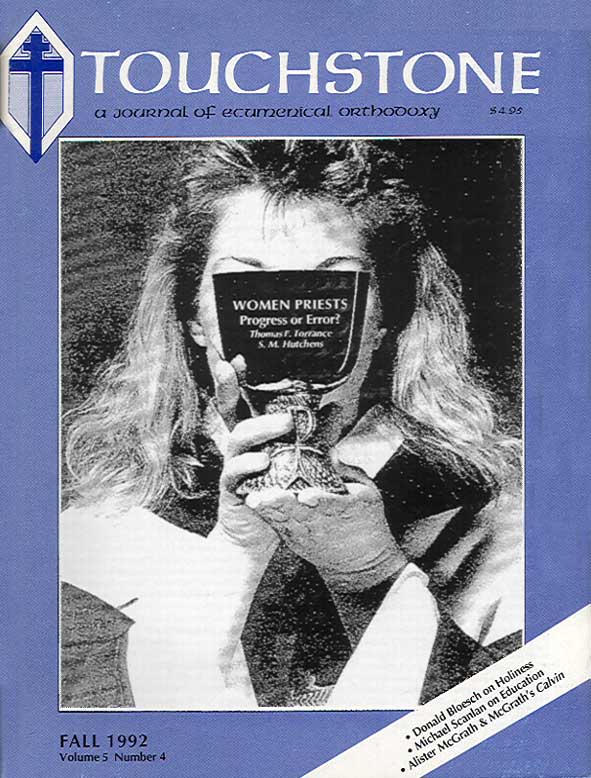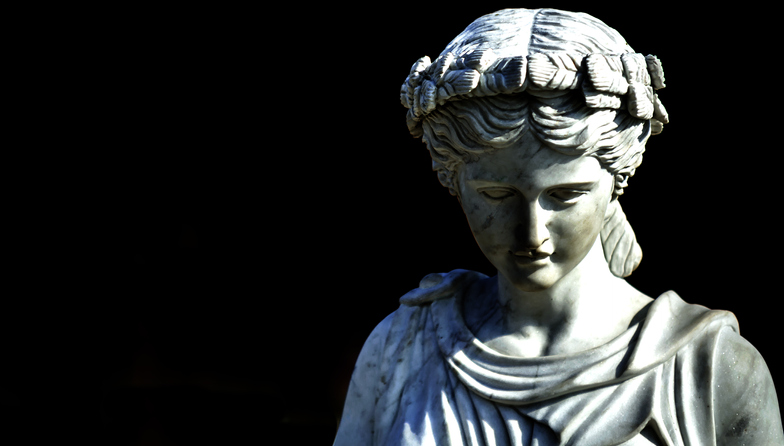Faithfulness in Christian Higher Education
by Michael Scanlan
A number of years ago I was given an honorary degree by my undergraduate alma mater, Williams College. Williams has a long tradition of producing ministers and missionaries. While there I picked up the school newspaper. The burning issue among the students was whether the chapel, one of the most impressive buildings on campus, should be converted into a swimming pool or a billiards hall. This was my first warning that Williams had changed.
That evening we had a symposium on the college’s direction and curriculum. I said that we needed to consider our heritage and reputation for having prepared more ministers for its size than any other New England liberal arts college of the Ivy League flavor. Predictably the response was bafflement about why we should be committed to what we’ve done before or to “what our monuments were.”
When I returned home I began to look carefully at literature sent by my other alma mater, Harvard. The seal on all of Harvard’s stationery bears the legend, “For Christ and Church.” It is Latin, so perhaps its religious message goes down more easily at that thoroughly secular institution. Underneath is the word veritas. That might well be translated “truth,” but at Harvard’s founding it had a religious meaning.
The secularization of such schools is striking and representative of what has happened and is still happening in many colleges founded for Christian purposes. I am not denigrating these institutions or to question their right to develop their purposes. In fact, I would like to say in their favor that they no longer affirm that they are Christian or carry a Christian label. The more serious problem in Christian higher education today is rather those institutions that carry the Christian label but have secularized. Integrity in Christian higher education requires that we be what we say we are. Over just this point there is a crisis in Christian higher education today.
A Call and a Proposal
The university that I represent, the Franciscan University of Steubenville, Ohio, is a small one, founded in 1946. It has 13 major buildings and approximately 1,800 students, of whom over 700 are residents. It is fully accredited by all the relevant regional and professional accrediting associations. It has master’s programs in theology, business administration, education, and counseling, as well as a school of nursing. It operates on a $20 million budget.
In 1974 I was invited to consider becoming president of the then College of Steubenville. I saw a deep secularization in the college. At the time enrollment was down. Two of the college’s dormitories were empty. Morale was low. It was in financial straits.
I said to the search committee and the board of trustees that the only way I could come to Steubenville—the only good I could do for it—would be to stand for the Christian values, the spiritual values, of its founding. I saw the need to put those values first. This would mean a change in priorities in the administration, in the budget, in the college’s general operating principles.
I rushed headlong into the responsibilities of the job without knowing what I was going to do. I had a lot of bold statements, but no plans. But I was confident that the renewal of the College of Steubenville was something that God wanted and that God was calling me to do. I just didn’t know how I was going to do it.
One thing I knew. Matthew 25 says the Lord judges by a standard of faithful service. Mother Teresa was once asked why she is so successful. She said, “I worry about faithfulness, not success.” I wasn’t sure what I was going to be successful at, but I was determined to make faithfulness to the Lord my first priority.
Clarity of Purpose
Likewise, a Christian institution must be faithful to the Lord. In liberal arts education, maturity is the primary goal, and competency for a profession or vocational field is secondary. A Christian college or university is called to go further, to give explicit priority to Jesus Christ, who is “the way, the truth, and the life” (John 14:6).
The teaching should be based first on revealed truth, and then be guided in its development by objective truth. Theology should be, as John Henry Newman said in The Idea of a University, the queen of the sciences, so that there is a rudder for all studies, so that the validation of truth and lack of truth is based on God’s word and empowered by the Holy Spirit, so that its life is based on the hope of eternal life, the overriding value.
To carry the Christian label, a college must stand for the values of Jesus Christ. He cannot be just an addition, an ancillary ministry program, or a few required theology courses. The Christian college or university must be part of the church, an extension of the church. It is a faith community involved in the teaching mission of the body of Christ.
Pastoral Responsibility
Now, if a college or university is church, there need to be pastors and teachers. Ephesians 4 says that God gives pastors and teachers so that the body of Christ may build itself up in love. A Christian college must have someone who clearly has the authority and responsibility to pastor the Christian life there and to direct the teaching.
Shortly after I arrived at Franciscan University, I was presented with a number of demands. The students demanded open dorms and free visitation between men and women, and the student life office said that since people slept in so late on Sunday mornings, why not eliminate the Sunday morning liturgy and hold it in the evening?
I realized that I would have to be pastor of the campus. I would have to foster Christian values in every area of university life. I would have to personally preside and peach at the Sunday morning liturgy. And, instead of opening the residence halls, I would have to reorganize them into “faith households.”
Shortly thereafter I submitted to the board of trustees an amendment to the bylaws, which they approved, stating that the president shall be not only the chief executive officer, but also the pastor. Although I went through a lot of anguish fulfilling the job of pastor, I could never back off.
A pastor has to offer a vision for Christian life and teach how to live it. A pastor has to address basic and practical questions: What is the normal Christian life? What does Christian culture mean? What does dating mean in Christian life? How are men to be men, women to be women? What about the use of alcohol? What about rock music? How do you move toward marriage? All these issues are part of the Christian educational and personal development programs on campus.
Being Church
If the purpose of Christian education is to bring students to the Lord Jesus Christ and to their proper roles as church members, they need to be drawn into church. Evangelization results in belonging to Christ and to his body, to the ecclesia. The Christian college or university trains and prepares men and women for roles of leadership and ministry in that body.
We are clearly Franciscan and hence Roman Catholic. As such we submit to and stand for the Magisterium, or teaching authority, of the Roman Catholic church and to Pope John Paul II. At the same time we live out an ecumenical commitment of Vatican II. We stand strongly for the salvation in Jesus Christ and the membership in the body of Christ that goes beyond the visible boundaries of the Church.
Strategy
Having offered these Christian purposes, what strategy can you follow to achieve them? From our experience, I offer the following:
First, there needs to be an environment reflecting a life lived in Jesus Christ and in the power of the Holy Spirit. Without an environment of faith, structures of faith become legalism. How can we build a faith environment? We have to have it in one place first before we build it somewhere else. We established an environment of faith through a Christian Renewal Center. We set aside our largest building on campus to establish a committed Christian environment. From that base we dealt with the whole situation. We drew together willing lay faculty, priests, and religious sisters to help us establish a faith environment.
Second, campus structures should establish a common way of life consistent with Christian morality and holiness. We established small units of Christian life, called “households.”
Third, you should promulgate a consensus commitment on the critical values. Those who have authority, those who make decisions, those who teach must be brought into a clear, united statement of what the institution stands for. Three years after I came to Franciscan University we put together such a statement, and four years later we developed it to encompass all of university life. The faculty, the student body, and the board of trustees then unanimously approved it. In it we expressed the basic values of the institution. That gave us something to build on. From then on, the statement guided us in evaluating and hiring faculty members and in continuing, replacing, or initiating activities. I interview each faculty member before hiring to ascertain that he or she is committed to our mission. The following is an abridgement of that statement:
We are a Christian, Catholic, Franciscan university dedicated to the lordship of Jesus Christ in providing quality liberal arts education for the whole person and in integrating Christian values in all areas of life.
Fourth, there must be ongoing discernment about what to keep, convert, or replace and when to do it. If we are going to renew an institution, rather than destroy it and build a new one, we have to have some sense of when to act. It does not work simply and suddenly to announce that we are going to have a whole new university.
What is retrievable? What is built on the word of God, what is consonant with Christian tradition, what is in harmony with truth—and what is not? All teaching should center on truth; it should be based on and consistent with Christian revelation. This involves an examination of all academic departments and all teaching. What is built on sand must be scheduled for dismantling and separation from the university. What is built on rock needs to be retrieved, converted, strengthened, or deepened.
At the Franciscan University of Steubenville—and here I refer to faculty situations that have since changed—we found some very serious anti-Christian teaching going on. Atheistic Marxism was taught in the political science department. In psychology, we found a faculty situation that was very anti-Christian in its approach. In sociology, we found a humanism that did not allow for the rule of God and his providence. In student personnel administration, we found a kind of skepticism regarding eternal values and absolute truths. In drama, we found an attitude of art for art’s sake, rather than a commitment to serving the glory of God.
We had to gradually deal with all these faculty and curriculum situations. To some I had to say, “There are many universities and colleges that would want to reward what you are doing, but I don’t. I think you ought to move to an institution that matches your values. How can we work it out together?”
There is a sifting out of those unwilling or incapable of supporting the mission. If a person is not competent for the job, he cannot do it, no matter how good his value system. And if a person has the full competence but cannot be brought in line with the full mission, he cannot do the job either. Consequently there is a lot of attrition in the process of renewal.
Fifth, you must develop allies. We brought in groups that stood for the values we stood for. First was the St. Francis Association for Catholic Evangelism, the ministry of Father John Bertolucci. Then there was FIRE, a Catholic alliance for Faith, Intercession, Repentance, and Evangelism that puts on evangelistic and follow-up programs throughout the country. New Covenant magazine, the magazine of the Catholic charismatic renewal, established its headquarters on our campus. The Human Life Center, which was the first and most prominent of the organizations in the anti-abortion fight within the Catholic church in the United States, located its headquarters on our campus. They supported our values. They brought in new people, some of whom could then be hired, promoted, and brought up throughout the university system.
Prayer
When I arrived at the Franciscan University of Steubenville I prayed fervently for things, especially when I was in desperate need. And I was in a lot of desperate need, including financial. Some mornings I would stay in prayer three to four hours before going to the office, asking the Lord what to do. Why go the office when you don’t know what to do? I thought I ought to find out what I was to do first in prayer, and then go and do it.
I find that most people who take on the leadership of Christian institutions do not ask the hard questions of God. “Lord, how am I going to get the money? Lord, where am I going to get the academic dean? Lord, I need a theologian who’s really going to be loyal and orthodox. Lord, where, how, what should I do?” In the depth of our prayer we ought to ask God the nitty-gritty questions. Sometimes we will receive a great breakthrough. At other times, we will receive just enough light to see the next step or two down the line according to God’s plan.
We should understand the need for ongoing intercession, for continuing to pray for what we do not have until we do have it or until God changes our mind and tells us we prayed for the wrong thing. (I used to pray for too many students in the early days. I finally got as many as I prayed for, and we almost capsized. We could not take on so many new ones at once without overwhelming our resources to teach a Christian way of life. I found out that God was smarter than I was. He knew I initially could not have taken all those students.)
We must recognize that prayer is our weapon in spiritual warfare. Satan is involved in the struggle for the integrity of Christian institutions. There are strongholds of Satan within faculties, within the university. They have to be broken in prayer. They have to be confronted.
Personally, as leaders, we need a Christian prayer community to support our own lives. For me, it has been the Franciscan community to which I belong.
It all finally comes down to personal honesty, institutional integrity, and faithfulness. Leading a Christian college is a matter of being who we say we are and sticking to it, and depending on the Lord for guidance and resources.
This article is adapted from a talk given in England on faithfulness in Catholic Higher Education.
Rev. Michael Scanlan, T.O.R., is the president of Franciscan University of Steubenville, Ohio. He is also a noted leader in the Catholic charismatic renewal movement, ecumenist, author and Catholic evangelist. His autobiographical book Let the Fire Fall (Ann Arbor; Servant, 1985) includes an account of his initial work in Steubenville.
subscription options
Order
Print/Online Subscription

Get six issues (one year) of Touchstone PLUS full online access including pdf downloads for only $39.95. That's only $3.34 per month!
Order
Online Only
Subscription

Get a one-year full-access subscription to the Touchstone online archives for only $19.95. That's only $1.66 per month!
bulk subscriptions
Order Touchstone subscriptions in bulk and save $10 per sub! Each subscription includes 6 issues of Touchstone plus full online access to touchstonemag.com—including archives, videos, and pdf downloads of recent issues for only $29.95 each! Great for churches or study groups.
Transactions will be processed on a secure server.
more from the online archives
calling all readers
Please Donate
"There are magazines worth reading but few worth saving . . . Touchstone is just such a magazine."
—Alice von Hildebrand
"Here we do not concede one square millimeter of territory to falsehood, folly, contemporary sentimentality, or fashion. We speak the truth, and let God be our judge. . . . Touchstone is the one committedly Christian conservative journal."
—Anthony Esolen, Touchstone senior editor









